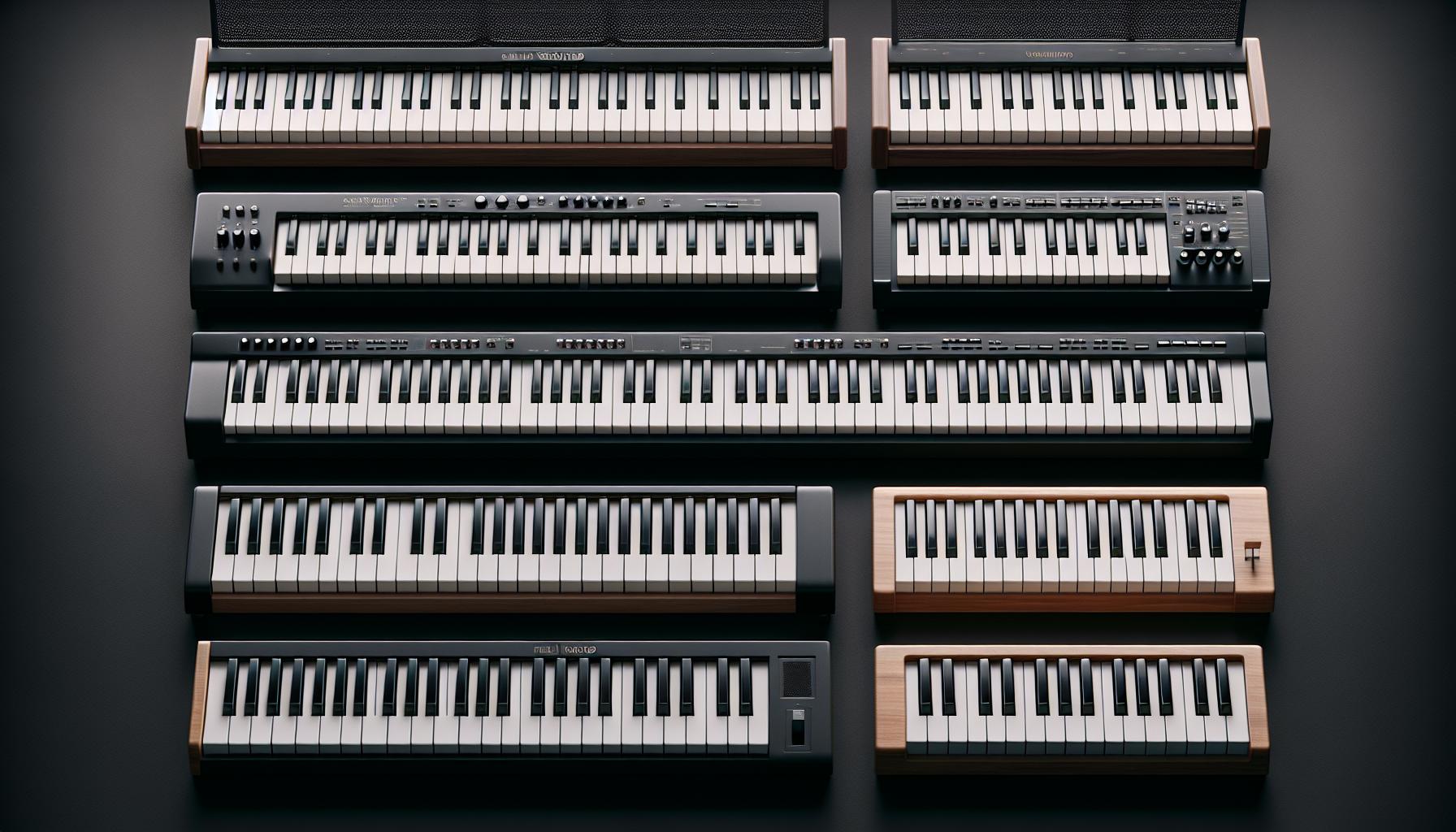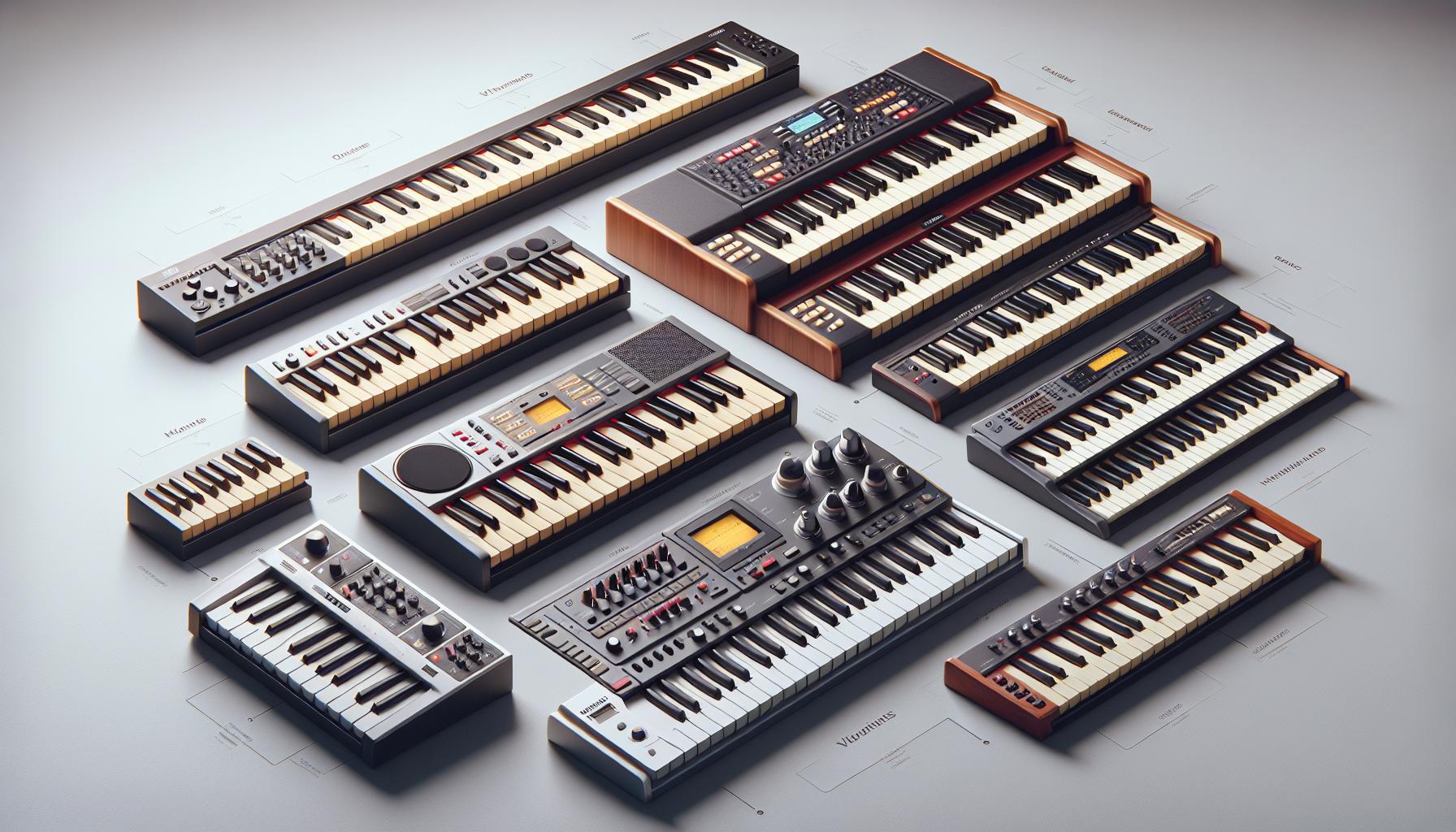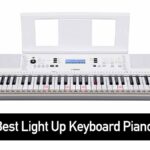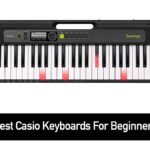Choosing the right weighted key piano keyboard can feel like a daunting task, especially for beginners. But don't worry, it's not as complicated as it might seem. With a little knowledge and guidance, anyone can find a keyboard that fits their needs and skill level.
The first thing to understand is what weighted keys are and why they're important. Simply put, they're designed to mimic the feel of an acoustic piano. This feature is crucial for those who want to build proper finger strength and technique.
In the following sections, we'll delve deeper into the world of weighted keys, exploring the different types, what to look for when buying, and some top recommendations. Whether you're a budding musician or an experienced pianist looking to upgrade, this guide's got you covered.
Understanding Weighted Keys
When you're first starting out in your piano journey, you might wonder, "what are weighted keys?" Well, weighted keys are designed to simulate the touch and feel of an acoustic piano's keys. Unlike lightweight keys of a standard keyboard, weighted keys have a certain amount of resistance when pressed.
Why does that matter? It's not just about the feel—it's about building finger strength and technique. Playing on weighted keys helps develop the correct finger technique that's needed when moving to play on an acoustic piano. Lightweight keys don't offer this advantage as they have a uniform resistance, making them less suitable for beginners.
Not all weighted keys are the same. There are different types of weighted keys, including semi-weighted keys, fully-weighted keys, and even graded hammer action keys. Each of these comes with their own unique feel and level of resistance.
- Semi-weighted keys combine the spring-loaded mechanism of synths with weights attached to the keys, making them a balanced choice with some resistance.
- Fully-weighted keys try to replicate the experience of playing an acoustic piano, providing more resistance than semi-weighted keys.
- Then there's the graded hammer action where the keys mimic an acoustic piano by having a heavier touch in the low end and a lighter touch in the high end.
By understanding what weighted keys are and their types, you're now in a better position to determine what's most important for your keyboard needs. Don't rush this decision. It's crucial to choose a keyboard with a keybed that matches your playing needs. Up next, let's explore what to look for when buying a weighted key keyboard and some top recommendations.
Types of Weighted Keyboards

As the article unfolds, knowledge of the different types of weighted keyboards becomes increasingly crucial. Offering different resistance levels and feels, these types cater to meticulous players specific needs. Let's delve into them!
A semi-weighted keyboard, often termed the 'middle ground', offers a balance between resistance and playability. Perfect for beginners, they're light, easy to play, and still provide some resistance to build finger strength. Although they can't entirely mimic acoustic pianos, they're still a decent pick for those starting their piano journey.
Appearing next on the list is the fully-weighted keyboard. These keyboards are an exemplary match for those who desire an acoustic piano feel. They offer similar resistance and key weight as a grand piano. It's a perfect choice for players of intermediate to advanced levels.
Lastly is the graded hammer action keyboard. Topping the class in terms of authenticity, they mimic the heavier weighted keys in the lower octaves, and lighter in the high. This nuance provides an added layer of expressivity and a natural feel, suitable for taking the player's skills to new heights. Players preparing for performances or those seeking to level up their technique often lean towards this charismatic keyboard.
Beyond just the types, buyers should also take into consideration their personal playing style, budget, and long-term goals. This will ensure they get the most out of their chosen keyboard while championing their unique playing journey.
In the forthcoming section, we'll explore how to shop for these keyboards and provide some top picks that deserve your attention. So, watch out for pro tips on selecting the best weighted piano keyboard that fits your personal requirements.
Factors to Consider when Choosing a Weighted Key Piano Keyboard

When choosing a weighted keyboard, there are several things to keep in mind. First and foremost, think about your skill level. As previously mentioned, semi-weighted keyboards are ideal for beginners as they provide a balance between resistance and playability. For those at an intermediate skill level or higher, fully-weighted or graded hammer action keyboards can offer the experience and feel of an acoustic piano.
Next, give consideration to your long-term goals. Are you planning to play professionally or is this more of a hobby? The type of keyboard you choose can have a significant impact on your musical journey. If you're aspiring to become a professional pianist, it's worth investing in a higher-end weighted keyboard that will grow as you progress in your music skills.
The third factor to take into account is your budget. While it’s crucial to choose a keyboard that matches your playing style and desires, practicality should not be neglected. Pianos can range from a few hundred to thousands of dollars. It’s important to note that more expensive doesn't always mean better. Prioritize models that satisfy your musical needs over those that may seem appealing due to high price tags or popular brands.
Lastly, take the time to do your research. With a myriad of models and brands on the market, finding the best keyboard for you can seem daunting. Fear not! There are a number of reliable sources online that offer detailed reviews and comparisons of popular weighted keyboards. This can significantly simplify the decision-making process, helping you achieve not just a good buy, but the right buy!
Top Recommendations for Weighted Key Piano Keyboards

Diving into the top recommendations, let's explore some of the best keyboards in the market.
Starting with the Yamaha P125 88-Key Weighted Action Digital Piano. It's a fantastic option for both beginners and intermediate players. This keyboard is noted for its fully-weighted keys, excellent sound quality and useful features like the ability to record your playing.
Up next, the Roland FP-30 88 Keys SuperNATURAL Digital Portable Piano stands out for its graded hammer action keys. It's great for those looking for a realistic piano playing experience. It also includes some tech-savvy features such as Bluetooth connectivity for music streaming.
Let's not forget about the Casio Privia PX-160 Digital Piano. It's an excellent choice for those working with a tighter budget. Despite its affordability, it doesn't skimp on quality. It comes with 88 weighted keys and a rich sound that rivals more expensive models.
For professionals, the Kawai ES8 Digital Home Piano tops the list. Though a little bit pricier, its quality, range of sounds, and realistic key responses make it worth every penny.
Here's a quick comparison of these top picks:
| Keyboard Model | Key Type | Notable Features |
|---|---|---|
| Yamaha P125 | Fully-Weighted | Record Feature |
| Roland FP-30 | Graded Hammer Action | Bluetooth Connectivity |
| Casio Privia PX-160 | Weighted | Great for Budget |
| Kawai ES8 | Weighted | Best for Professionals |
While these keyboards are great choices, remember that the 'best' keyboard will ultimately depend on personal preference, playing style, and long-term goals. The next step is to try a few out, so don't be shy about going to a music store to test out some of these top picks.
Conclusion
Choosing a weighted key piano keyboard isn't a one-size-fits-all scenario. It's about finding what feels right for you and aligns with your goals. Whether you're a beginner drawn towards the Yamaha P125 or a seasoned professional eyeing the Kawai ES8, it's essential to remember that the keyboard's quality and your comfort with it matter the most.
Don't shy away from trying keyboards in person. It's the best way to understand the feel of the keys and the sound quality. And remember, whether it's the Roland FP-30's realistic piano experience or the affordability of the Casio Privia PX-160, there's a keyboard out there that's just right for you. So, take your time, do your research, and most importantly, enjoy the journey of choosing your perfect weighted key piano keyboard.
Harlan Kilstein began playing piano during covid with no piano background at all. He taught himself how to play learning what to do and what not to do.
Today he's an advanced intermediate player and can help you grow in your skills because he learned all this on his own.








